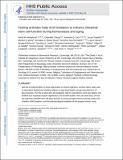Fasting Activates Fatty Acid Oxidation to Enhance Intestinal Stem Cell Function during Homeostasis and Aging
Author(s)
Mihaylova, Maria M.; Cheng, Chia-Wei; Cao, Amanda Q.; Tripathi, Surya; Mana, Miyeko D.; Bauer-Rowe, Khristian E.; Abu-Remaileh, Monther; Clavain, Laura; Erdemir, Aysegul; Lewis, Caroline A.; Freinkman, Elizaveta; Huang, Yanmei; Bell, George W.; Sabatini, David M.; Yilmaz, Ömer H.; ... Show more Show less
DownloadAccepted version (963.8Kb)
Publisher with Creative Commons License
Publisher with Creative Commons License
Creative Commons Attribution
Terms of use
Metadata
Show full item recordAbstract
Diet has a profound effect on tissue regeneration in diverse organisms, and low caloric states such as intermittent fasting have beneficial effects on organismal health and age-associated loss of tissue function. The role of adult stem and progenitor cells in responding to short-term fasting and whether such responses improve regeneration are not well studied. Here we show that a 24 hr fast augments intestinal stem cell (ISC) function in young and aged mice by inducing a fatty acid oxidation (FAO) program and that pharmacological activation of this program mimics many effects of fasting. Acute genetic disruption of Cpt1a, the rate-limiting enzyme in FAO, abrogates ISC-enhancing effects of fasting, but long-term Cpt1a deletion decreases ISC numbers and function, implicating a role for FAO in ISC maintenance. These findings highlight a role for FAO in mediating pro-regenerative effects of fasting in intestinal biology, and they may represent a viable strategy for enhancing intestinal regeneration. Mihaylova et al. show that short-term fasting promotes intestinal stem and progenitor cell function in young and aged mice by inducing a robust fatty acid oxidation (FAO) program. PPARδ agonists emulate these effects, showing that fatty acid metabolism has positive effects on young and old ISCs.
Date issued
2018-05Department
Whitehead Institute for Biomedical Research; Massachusetts Institute of Technology. Department of Biology; Koch Institute for Integrative Cancer Research at MITJournal
Cell Stem Cell
Publisher
Elsevier BV
Citation
Mihaylova, Maria M. et al. "Fasting Activates Fatty Acid Oxidation to Enhance Intestinal Stem Cell Function during Homeostasis and Aging." Cell Stem Cell 22 (2018): 769-778 © 2018 The Author(s)
Version: Author's final manuscript
ISSN
1934-5909
Keywords
Molecular Medicine, Genetics, Cell Biology